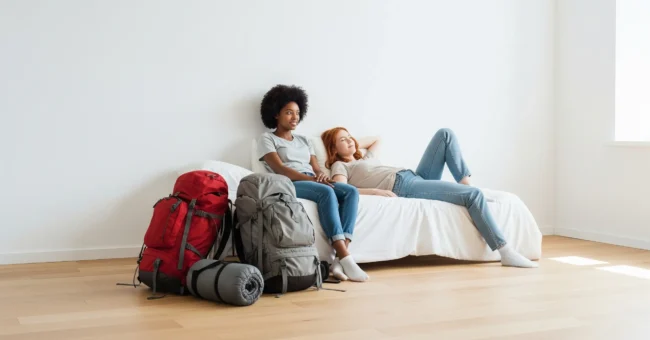
Free accommodations abroad: how to travel without spending in 2025 🌍
Perhaps you’ve noticed it too: travelling is becoming a luxury fewer and fewer people can afford. Prices are rising, opportunities seem to be shrinking, and what was once a dream within reach for many is increasingly becoming the privilege of a few.
And yet, there’s one quiet privilege we often take for granted: simply having a passport that allows us to move freely from one country to another. Not everyone has that. It’s worth remembering, so we can travel with gratitude and awareness.
The good news? There are still plenty of ways to travel for next to nothing. Alternative ways, built on sharing, exchange, and human connection. Ways that not only help you save money, but also open the door to authentic, meaningful, and often unforgettable experiences.
Of course, “travelling with no money” doesn’t mean taking advantage of others or expecting everything for free. It’s about building connections, giving something in return, and sharing moments based on mutual respect and trust.
In this article, we’ll show you how to make it happen in 2025, with an updated toolkit of the best apps, most reliable websites, and most practical tips for exploring the world on a shoestring, slowly, sustainably, and mindfully.
Free hospitality networks, discovering new cultures from local perspectives 🛋️
Hospitality exchange platforms connect travellers with locals willing to open their homes without expecting payment. Trustroots is great for hitchhikers and nomadic travellers, Warmshowers focuses specifically on cyclists, and BeWelcome is known for its nonprofit and community-driven approach. Couchers emerged recently as an ethical alternative to Couchsurfing, the latter having moved to a commercial model that has raised questions among many longtime users.
Each platform emphasises authentic interactions between hosts and guests, allowing travellers to immerse themselves fully in the culture and daily life of their destinations.
- Trustroots – for hitchhikers, nomads, and alternative travellers
- Warmshowers – dedicated to touring cyclists worldwide
- BeWelcome – ethical, nonprofit hospitality exchange community
- Couchers – created as an open, community-led alternative
- Couchsurfing – once pioneering, now a commercial platform with a mixed reputation
While hospitality platforms offer a beautiful way to connect with others, it’s important to remember that generosity should not be one-sided. The costs of a journey should never fall entirely on the shoulders of the host. A fair exchange can take many forms: you might offer help around the house, cook a meal, or bring a small gift from your country.
If you’re staying for more than a night or two, consider making a financial contribution, especially in countries where utilities and food are expensive. In Europe, for example, the daily cost of hosting someone (electricity, water, food) can easily reach 10 to 15 euros per person. Being aware of this helps keep the exchange balanced, respectful, and sustainable.
Work exchanges abroad, trading skills for meaningful stays 🌱
Another popular way to travel and stay abroad for free involves exchanging a few hours of work per day for accommodation and meals. WWOOF specializes in organic farming experiences worldwide, while Workaway and HelpX offer a broader range of opportunities like guesthouses, social projects, or small family-run businesses.
- WWOOF – work on organic farms in exchange for food and lodging
- Workaway and HelpX – stay with host families, in hostels, or eco-projects while helping a few hours a day
- Voluntouring.org – free-to-browse network for ethical volunteering and hospitality exchange worldwide
Alternative accommodation exchanges, creative ways to stay abroad 🏡
Besides traditional hospitality exchanges or volunteering, travellers can also find opportunities in alternative ways. Au Pair arrangements allow travellers to live with families abroad, assisting with childcare or household chores while experiencing local life firsthand. TrustedHousesitters and Nomador are platforms that connect travelers with homeowners needing someone to care for their home or pets while away.
Local ads, social media groups, or websites like Voluntouring.org occasionally offer unique caretaking opportunities, allowing visitors to stay abroad in exchange for simple tasks such as gardening, animal care, or basic maintenance.
- AuPairWorld – one of the most popular and established platforms for au pair placements worldwide
- GreatAuPair – connects au pairs with families in over 150 countries
- Nanny Lane – mostly US-based, but includes international au pair listings
Finding free stays through Facebook groups and online communities
While dedicated platforms are a great starting point, many travellers today also use social media to find free accommodation abroad and authentic travel opportunities.
Facebook groups, in particular, are vibrant communities where hosts and travellers connect directly, often in real time. These groups can help you discover small, off-the-map projects or informal invitations that never make it onto mainstream platforms.
Some valuable communities to explore include:
👉 Slow travel & volunteer exchange – a space for slow travellers, hosts, and cultural exchange
👉 Volunteering for free (ethical projects only) – a curated group for ethical and fair opportunities
👉 Couchsurfing: One Group One World – a community that continues the spirit of couchsurfing, beyond the official platform
By staying active in these groups, asking questions, and checking regularly, you can often find last-minute opportunities or unique host offers that aren’t listed anywhere else.
- Telegram channels and WhatsApp groups – used by digital nomads and slow travellers to share last-minute host offers and informal volunteer roles. Ask around in forums or Facebook groups to get invites.
- Reddit communities – subreddits like r/Shoestring, r/travelpartners, or r/digitalnomad often feature spontaneous opportunities for free stays or collaborations.
- Mastodon and the Fediverse – niche communities using hashtags like #hospitalityexchange or #solarpunktravel sometimes share alternative hosting ideas with an ethical twist.
- Personal blogs and small project websites – some hosts or eco-projects publish volunteer opportunities only on their own websites. Try alternative search engines with queries like “volunteer accommodation site:.org”.
- Noticeboards and local hubs – cafés, hostels, or community centres in popular travel zones often feature printed ads or word-of-mouth offers you won’t find online.
Safe travel without money, practical guidelines for travellers 🛡️
🛡️ Staying safe while travelling for free
Finding free accommodation abroad can open doors to meaningful experiences – but just like with any kind of travel, it’s important to take care of yourself along the way. Trust and generosity are at the heart of hospitality exchange, but that doesn’t mean letting your guard down completely.
Before accepting a stay or work exchange offer, take the time to get to know your host. Most platforms encourage mutual transparency, but it’s up to you to ask questions and follow your instincts. A bit of preparation can go a long way in making your experience safe, smooth, and enjoyable.
- Check reviews and references – Look for detailed feedback from past guests or volunteers. If a profile has no reviews, proceed with more caution and ask direct questions.
- Request a video call – Don’t rely only on messages. A short video or phone call can help you feel out the vibe, clarify expectations, and confirm the host is who they say they are.
- Clarify the details in advance – Ask what’s expected of you, what’s included (food, room type, hours), and what the day-to-day rhythm is like. Avoid surprises.
- Have a plan B – Even if you’re travelling on a budget, try to keep an emergency fund in case you need to leave unexpectedly or cover transport or a night in a hostel.
- Tell someone where you are – Share your host’s name, address, and contact info with a trusted friend or family member. Check in regularly, especially if you’re staying in a rural or remote place.
- Respect boundaries – yours and theirs. Every home has its rhythm. Be clear about your own limits, too, and walk away if something doesn’t feel right.
Most people you’ll meet are kind and generous, but it’s okay to be cautious. Trust your gut, stay connected, and remember: a respectful and open attitude helps create a positive experience for both guest and host.
Travelling without money is open to all ages 🚶♀️🚶♂️
Free accommodation and travel exchange opportunities aren’t just for young backpackers with limited budgets. In fact, many older travelers, including retirees and solo adventurers over 50 or 60, are actively part of these communities.
Hosts often value the life experience, practical skills, and calm presence that more mature guests can bring – whether it’s cooking, gardening, language support, or simply sharing stories. Age is not a limitation. If anything, it can open doors to deeper connections and more thoughtful exchanges.
Whether you’re looking for a slower pace, a change of scenery, or a meaningful way to spend time after retirement, these forms of travel offer something different. All it takes is curiosity, adaptability, and the willingness to engage with others on a human level.
A renewed perspective on travel
Staying with locals, exchanging time or help, and stepping off the usual routes often leads to more honest, human experiences. If you’ve tried this kind of travel or know other ways to do it, feel free to share. Your story might help someone else take the first step.








